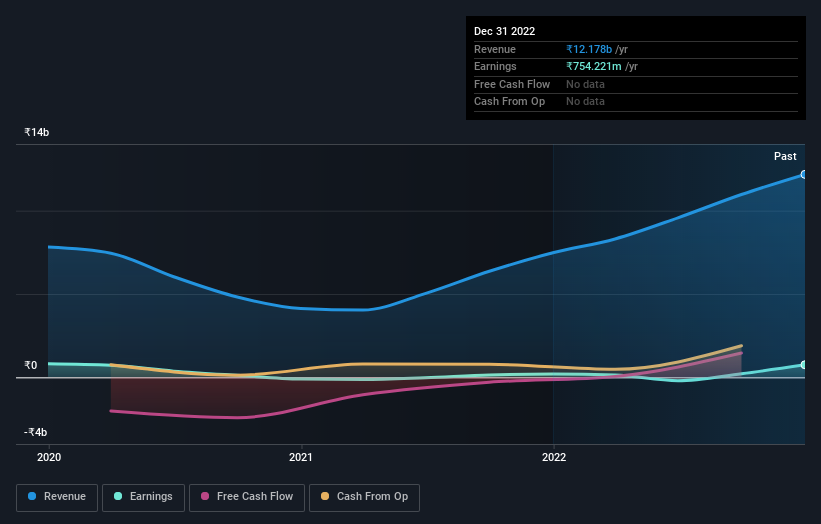- India
- /
- Paper and Forestry Products
- /
- NSEI:KUANTUM
Kuantum Papers (NSE:KUANTUM) investors are up 13% in the past week, but earnings have declined over the last three years

The worst result, after buying shares in a company (assuming no leverage), would be if you lose all the money you put in. But when you pick a company that is really flourishing, you can make more than 100%. To wit, the Kuantum Papers Limited (NSE:KUANTUM) share price has flown 264% in the last three years. How nice for those who held the stock! Better yet, the share price has risen 13% in the last week.
After a strong gain in the past week, it's worth seeing if longer term returns have been driven by improving fundamentals.
Check out our latest analysis for Kuantum Papers
While markets are a powerful pricing mechanism, share prices reflect investor sentiment, not just underlying business performance. One imperfect but simple way to consider how the market perception of a company has shifted is to compare the change in the earnings per share (EPS) with the share price movement.
Over the last three years, Kuantum Papers failed to grow earnings per share, which fell 2.5% (annualized).
Companies are not always focussed on EPS growth in the short term, and looking at how the share price has reacted, we don't think EPS is the most important metric for Kuantum Papers at the moment. So other metrics may hold the key to understanding what is influencing investors.
It could be that the revenue growth of 23% per year is viewed as evidence that Kuantum Papers is growing. If the company is being managed for the long term good, today's shareholders might be right to hold on.
You can see how earnings and revenue have changed over time in the image below (click on the chart to see the exact values).

If you are thinking of buying or selling Kuantum Papers stock, you should check out this FREE detailed report on its balance sheet.
What About The Total Shareholder Return (TSR)?
We've already covered Kuantum Papers' share price action, but we should also mention its total shareholder return (TSR). Arguably the TSR is a more complete return calculation because it accounts for the value of dividends (as if they were reinvested), along with the hypothetical value of any discounted capital that have been offered to shareholders. Its history of dividend payouts mean that Kuantum Papers' TSR of 283% over the last 3 years is better than the share price return.
A Different Perspective
We're pleased to report that Kuantum Papers rewarded shareholders with a total shareholder return of 55% over the last year. That falls short of the 56% it has made, for shareholders, each year, over three years. I find it very interesting to look at share price over the long term as a proxy for business performance. But to truly gain insight, we need to consider other information, too. Like risks, for instance. Every company has them, and we've spotted 3 warning signs for Kuantum Papers (of which 1 doesn't sit too well with us!) you should know about.
If you like to buy stocks alongside management, then you might just love this free list of companies. (Hint: insiders have been buying them).
Please note, the market returns quoted in this article reflect the market weighted average returns of stocks that currently trade on Indian exchanges.
Valuation is complex, but we're here to simplify it.
Discover if Kuantum Papers might be undervalued or overvalued with our detailed analysis, featuring fair value estimates, potential risks, dividends, insider trades, and its financial condition.
Access Free AnalysisHave feedback on this article? Concerned about the content? Get in touch with us directly. Alternatively, email editorial-team (at) simplywallst.com.
This article by Simply Wall St is general in nature. We provide commentary based on historical data and analyst forecasts only using an unbiased methodology and our articles are not intended to be financial advice. It does not constitute a recommendation to buy or sell any stock, and does not take account of your objectives, or your financial situation. We aim to bring you long-term focused analysis driven by fundamental data. Note that our analysis may not factor in the latest price-sensitive company announcements or qualitative material. Simply Wall St has no position in any stocks mentioned.
About NSEI:KUANTUM
Kuantum Papers
Produces, markets, and sells agro and wood-based paper products in India.
Good value average dividend payer.
Market Insights
Community Narratives



